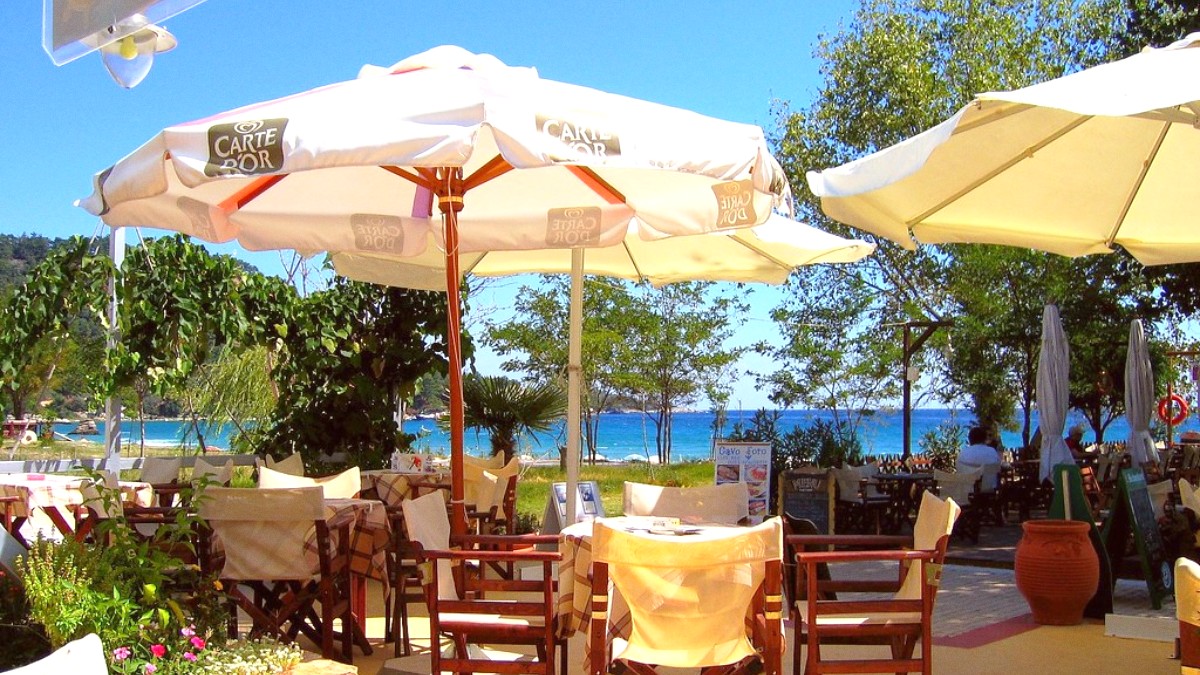
Northeastern Aegean Islands, Greece
Thasian cuisine embodies the essence of the northern Aegean. Its dishes reflect centuries of reliance on the sea and the land.
The island's rich olive groves produce high-quality oil, a cornerstone of nearly every dish. Beekeeping is an ancient tradition, making Thasian honey a prized local product. Simple, fresh ingredients prepared with traditional methods define the cuisine.
Expect an abundance of fresh fish (like sardines, anchovies, sea bream, red mullet), various seafood (octopus, calamari, mussels, shrimp), and locally sourced meat (especially goat and lamb). Olives (Throumba variety), the island’s distinctive olive oil, pine nuts, and wild herbs feature prominently.
Thasian cuisine is savory and aromatic. Flavors are typically bright, often enhanced with fresh lemon juice and garlic. It generally uses less spice than some other Mediterranean cuisines, letting the natural taste of the ingredients shine.
Thasian olive oil is a Protected Designation of Origin (PDO) status. The island's pine honey is another distinct product. Local sweets like "karidopita" (walnut cake) and "revani" (a semolina cake soaked in syrup) are popular. Mountain villages like Theologos are especially known for their slow-cooked meat dishes, especially goat.
Fresh sardines cured in salt, a local specialty. They have a distinct, savory taste and are often served as a meze with ouzo.
Find them at fish tavernas, especially in Limenas.
The island is famous for its "Throumba" olives, cured on the tree, and its high-quality extra virgin olive oil. Taste them in salads or as a dip.
Available everywhere, from markets to tavernas.
Often slow-cooked in a clay pot (stifado) or roasted on a spit (souvla). This tender and flavorful meat is a highlight.
A top choice in traditional tavernas, specifically in mountain villages like Theologos.
Sliced meat (usually pork or chicken) roasted on a vertical spit, served in warm pita bread with tzatziki, tomato, onion, and fries. Souvlaki are small skewers of grilled meat. Quick, satisfying, and affordable meals.
Savory spinach or cheese pies (Spanakopita/Tiropita) made with flaky filo pastry. Excellent for breakfast or a snack, available at bakeries. During Greek Orthodox Easter, spit-roasted lamb is a prominent traditional feature.
True fine dining experiences are limited. Some upscale hotels or specialized restaurants, especially in Limenas or Limenaria, feature a more refined dining experience.
These are abundant throughout the island, especially in tourist towns and coastal villages. This category includes traditional tavernas, "psarotavernas" (fish tavernas), and some international cuisine.
Numerous gyros/souvlaki shops, bakeries, and small cafes offer excellent value for money. International cuisine options are available, mainly in larger tourist centers like Limenas.
Many Greek dishes are naturally vegetarian, including the famous Greek salad (χωριάτικη σαλάτα), fava (split pea purée), gigantes plaki (baked giant beans), briam (roasted mixed vegetables), and various vegetable stews (ladera). "Horta" (boiled wild greens) are also common.
For vegan options, be mindful of hidden dairy or eggs. Look for "nistisima" (νηστίσιμα) dishes, traditionally prepared during fasting periods and usually vegan.
Awareness of gluten-free and other allergen-aware dining is growing in Greece, but is not universal. Communicate clearly about your allergies. Many traditional dishes, like grilled meats or fish, salads, and vegetable dishes, are naturally gluten-free.
Bread is a staple, so specify if you need to avoid it.
Halal and kosher options are limited. Inquire directly about preparation methods. Grilled chicken or fish can be halal-friendly.
Carry a travel allergy card translated into Greek to clearly convey your dietary restrictions to staff.
Simple phrases like "Eímai hortofágos" (I am vegetarian) aid communication.
Research restaurants in advance or use online reviews for dietary options. Hotel restaurants may be more equipped.
Beyond simply eating, Thasos presents opportunities to immerse yourself in its culinary culture.
Embrace the Greek custom of ordering various small plates (mezedes) to share, making it possible for everyone to taste different flavors and socialize.
A fantastic way to sample the local cuisine.
Dinner is a relaxed social affair, typically starting later in the evening and often extending late, especially during warm summer nights. Enjoy the leisurely pace.
Perfect for unwinding with family and friends.
Indulge in traditional desserts like Loukoumades (honey-drizzled fried dough balls) and Baklava (layers of filo pastry with nuts and syrup). These are iconic Greek sweets.
Greek yogurt with local Thasian honey, often topped with walnuts, a simple and healthy dessert. Many restaurants offer this as a complimentary treat.
Discover the history of olive oil production and taste fresh olive oil at this privately run museum. Learn about one of the island's most main agricultural traditions.
Purchase local honey, olives, and cheese directly from producers at small local markets, especially in Limenas. This supports the local economy.
Traditional religious festivals take place throughout the island, often featuring live Greek music, traditional dancing, and local food. They present a lively insight into local customs.
Always ask for the "catch of the day" at fish tavernas for the freshest seafood experience during your visit.
A for seafood lovers.
Purchase local honey, olive oil, and olives from markets to bring a piece of Thasos's flavor home with you. These make wonderful souvenirs.
Support island producers directly.
Discover the island's unique products: Throumba olives, pine honey, and the Protected Designation of Origin olive oil.
Participate in local "panigyria" for traditional food and dancing, immersing yourself in Thasian customs and local life.
Dine at a mountain taverna in Theologos for slow-cooked goat or lamb, a true taste of island life in a rustic atmosphere.
Explore Thasos's culinary landscape to savor authentic flavors and dining experiences.